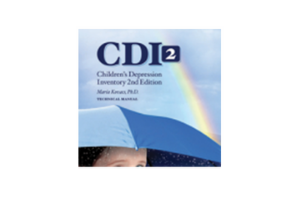Description
Children’s Depression Inventory 2™ (CDI 2) is a brief self-report test that helps assess cognitive, affective and behavioral signs of depression in children and adolescents.

Children’s Depression Inventory 2™ (CDI 2) is a brief self-report test that helps assess cognitive, affective and behavioral signs of depression in children and adolescents.
Children’s Depression Inventory 2™ (CDI 2) is a brief self-report test that helps assess cognitive, affective and behavioral signs of depression in children and adolescents.
Maria Kovacs, PhD
Overview:A brief self-report test that helps assess cognitive, affective and behavioral signs of depression in children and adolescents 7 to 17 years old.
Age Range:7 through 17 years
Administration:Paper-and-pencil; CDI 2: 15-20 minutes; CDI 2 Short: 5 minutes
Reading Level:2nd grade
Forms:Two: CDI 2 and CDI 2 Short
Publication Date:2010

The Children’s Depression Inventory 2 contains 28 items, each of which consists of three statements. For each item, the individual is asked to select the statement that best describes his or her feelings. The assessment is designed for a variety of situations, including schools, child guidance clinics, pediatric practices, and child psychiatric settings.
The Children’s Depression Inventory 2 is used by clinicians and counselors to help:
The CDI 2 normative sample includes 1,100 children aged 7 to 17 years from 26 different states in the U.S. The sample is evenly proportioned in terms of age and gender, with 50 males and 50 females at each age. The racial/ethnic distribution of the sample matches the U.S. census distribution very closely (i.e., all races were within 1% of Census targets, based on the 2000 U.S. Census report). Overall, the normative sample includes a reasonable spread of geographical locations of all four major regions of the U.S.
A clinical sample of 319 youth aged 7 to 17 years (M age = 12.63 years, SD age = 3.02 years) diagnosed with Major Depressive Disorder (MDD; 33.86%), Attention-Deficit/Hyperactive Disorder (ADHD; 28.21%), Conduct Disorder (CD; 14.11%), Generalized Anxiety Disorder (GAD; 13.79%), or Oppositional Defiant Disorder (ODD; 10.03%) was obtained.
The test is hand-scored.
Profile Report
Presents a total score as well as scores for each scale